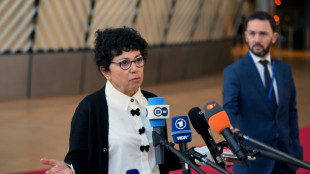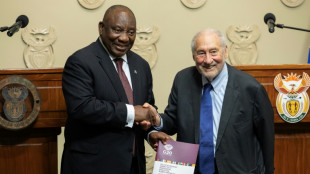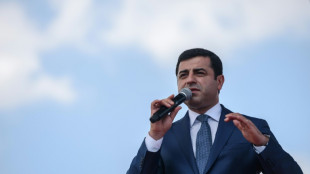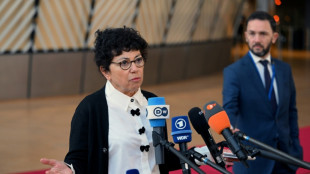
-
 EU scrambles to seal climate targets before COP30
EU scrambles to seal climate targets before COP30
-
Getty Images largely loses lawsuit against UK AI firm

-
 Cement maker Lafarge on trial in France over jihadist funding
Cement maker Lafarge on trial in France over jihadist funding
-
Sculpture of Trump strapped to a cross displayed in Switzerland

-
 Pakistan's Rauf and Indian skipper Yadav punished over Asia Cup behaviour
Pakistan's Rauf and Indian skipper Yadav punished over Asia Cup behaviour
-
Libbok welcomes 'healthy' Springboks fly-half competition

-
 Reeling from earthquakes, Afghans fear coming winter
Reeling from earthquakes, Afghans fear coming winter
-
Ronaldo reveals emotional retirement will come 'soon'

-
 Munich's surfers stunned after famed river wave vanishes
Munich's surfers stunned after famed river wave vanishes
-
Iran commemorates storming of US embassy with missile replicas, fake coffins

-
 Gauff sweeps Paolini aside to revitalise WTA Finals defence
Gauff sweeps Paolini aside to revitalise WTA Finals defence
-
Shein vows to cooperate with France in probe over childlike sex dolls

-
 Young leftist Mamdani on track to win NY vote, shaking up US politics
Young leftist Mamdani on track to win NY vote, shaking up US politics
-
US government shutdown ties record for longest in history

-
 King Tut's collection displayed for first time at Egypt's grand museum
King Tut's collection displayed for first time at Egypt's grand museum
-
Typhoon flooding kills over 40, strands thousands in central Philippines

-
 Trent mural defaced ahead of Liverpool return
Trent mural defaced ahead of Liverpool return
-
Sabalenka to face Kyrgios in 'Battle of Sexes' on December 28

-
 Experts call for global panel to tackle 'inequality crisis'
Experts call for global panel to tackle 'inequality crisis'
-
Backed by Brussels, Zelensky urges Orban to drop veto on EU bid

-
 After ECHR ruling, Turkey opposition urges pro-Kurd leader's release
After ECHR ruling, Turkey opposition urges pro-Kurd leader's release
-
Stocks drop as tech rally fades

-
 UK far-right activist Robinson cleared of terror offence over phone access
UK far-right activist Robinson cleared of terror offence over phone access
-
World on track to dangerous warming as emissions hit record high: UN

-
 Nvidia, Deutsche Telekom unveil 1-bn-euro AI industrial hub
Nvidia, Deutsche Telekom unveil 1-bn-euro AI industrial hub
-
Which record? Haaland warns he can get even better

-
 Football star David Beckham hails knighthood as 'proudest moment'
Football star David Beckham hails knighthood as 'proudest moment'
-
Laurent Mauvignier wins France's top literary award for family saga

-
 Indian Sikh pilgrims enter Pakistan, first major crossing since May conflict
Indian Sikh pilgrims enter Pakistan, first major crossing since May conflict
-
Former US vice president Dick Cheney dies at 84

-
 Fiorentina sack Pioli after winless start in Serie A
Fiorentina sack Pioli after winless start in Serie A
-
Stocks drop as traders assess tech rally

-
 Oscar-winning Palestinian films daily 'Israeli impunity' in West Bank
Oscar-winning Palestinian films daily 'Israeli impunity' in West Bank
-
Spain's Telefonica shares drop on dividend cut, net loss

-
 Fierce mountain storms kill nine in Nepal
Fierce mountain storms kill nine in Nepal
-
Divisive Czech cardinal Dominik Duka dies at 82

-
 Shein vows to cooperate with France in sex doll probe
Shein vows to cooperate with France in sex doll probe
-
EU in last-ditch push to seal climate targets before COP30

-
 Finnish ex-PM Marin says her female cabinet faced torrent of sexism
Finnish ex-PM Marin says her female cabinet faced torrent of sexism
-
Sudan army-backed council to meet on US truce proposal: govt source

-
 BP profit surges despite lower oil prices
BP profit surges despite lower oil prices
-
Shein vows to cooperate with France in childlike sex doll probe

-
 National hero proposal for Indonesia's Suharto sparks backlash
National hero proposal for Indonesia's Suharto sparks backlash
-
Indian great Ashwin out of Australia's BBL after knee surgery

-
 Indian Sikh pilgrims enter Pakistan, first major crossing since May conflict: AFP
Indian Sikh pilgrims enter Pakistan, first major crossing since May conflict: AFP
-
Asian markets slip as traders eye tech rally, US rate outlook

-
 Nintendo hikes Switch 2 annual unit sales target
Nintendo hikes Switch 2 annual unit sales target
-
Typhoon flooding kills 5, strands thousands in central Philippines

-
 Jobe Bellingham finding his feet as Dortmund head to City
Jobe Bellingham finding his feet as Dortmund head to City
-
US civil trial to hear opening arguments on Boeing MAX crash


Apple's move to eSIM-only strengthens global trend
Apple's Tuesday announcement that the new iPhone 17 Air will only be available around the world without physical SIM cards marks a new advance for the virtual eSIM technology the firm has relied on in the US for years.
- What is an eSIM? -
Physical SIM cards contain all the information a phone needs to connect to a mobile network using the contract and number of a specific subscriber.
Users have been slotting the fingernail-sized plastic cards into their phones for decades when setting up a new handset, switching providers, or traveling.
eSIMs contain digital data with the same information as physical SIM cards, providing a "secure means for authenticating devices onto networks," the GSMA global standards-setting body says.
Most handsets released in recent years are capable of working with eSIMs, although many still offer a physical SIM slot as well.
Users can set up a new device or transfer eSIMs between phones through methods including scanning an operator-provided QR code, requesting a notification or text message from their network, or selecting the option to transfer an eSIM in their old phone's settings.
- How is using an eSIM different? -
Purely digital eSIMs can be downloaded remotely, simplifying tasks like signing up with a new network provider or switching operators—for example, to connect to a cheaper local network when traveling.
Using them also saves on plastic waste and distribution costs.
But setting up eSIMs in the first place requires internet access—meaning users firing up a new phone might need to connect to their home Wi-Fi network to activate their connection.
And travelers should activate their local eSIM in advance if they want service from the moment the plane lands at their destination.
Just like with physical SIMs, eSIMs can be activated or deactivated by the user on the handset—meaning that in theory they are no more or less trackable by operators or governments.
- Why has Apple pushed for eSIMs? -
Apple dropped physical SIM cards in the US starting with 2022's iPhone 14.
The tech giant's website promises "greater flexibility, enhanced convenience, better security, and seamless connectivity" for eSIM users.
Fewer physical parts "fits in with the vision of a slimmer, easier-to-use phone" long pursued by Apple, CCS Insight analyst Kester Mann told AFP.
On the business side, "perhaps they want a little bit more control over the journey to connect customers" to mobile operators when setting up a new phone, he added.
Consultancy Roland Berger agreed, suggesting in a report last year that eSIMs allow manufacturers to get between mobile operators and end users, "causing [operators] to lose control."
- What about other manufacturers? -
While competitors like Samsung have yet to release an eSIM-only phone, "the expectation is that they'll also go down that route as well," Mann said.
Google's latest Pixel 10 phones come in an eSIM-only version in the US.
"eSIM adoption is expected to gain traction... in the short-to-mid-term," Roland Berger predicted, forecasting 75 percent of all smartphone connections via eSIM in 2030, up from 10 percent in 2023.
CCS predicts the number of eSIM-capable handsets will grow from 1.3 billion currently to 3 billion in 2030.
- What impact have eSIMs had so far? -
In a survey of mobile network managers, Roland Berger found little sign of higher customer "churn" from the greater ease of switching providers.
Future uses of eSIM could include mobile operators offering subscribers more individually tailored services, the consultancy suggested.
For tourism, CCS Insight predicts local eSIM sales will rise from 70 million in 2024 to 280 million by 2030.
Providers such as Airalo and Holafly have sprung up to sell cheap foreign connectivity to tourists—although big incumbents like airlines and mobile operators are beginning to offer their own alternatives.
eSIMs also simplify machine-to-machine (M2M) communication, allowing remote setup or reconfiguration of connected devices—from watches to cars or smart electricity meters.
I.Saadi--SF-PST
